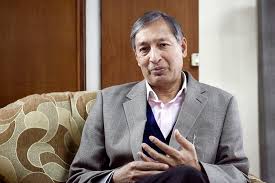Govt to sanitise media to keep society, culture healthy

Kathmandu / July 14: Minister for Finance, Communication and Information Technology Dr. Yuba Raj Khatiwada said on Monday that the government would sanitise media to save the country from social and cultural infections some of the media were causing.
Releasing four publications of the Department of Information and Broadcasting at Sanchar Gram today, Minister Khatiwada said that the sanitisation would be applied to all types of media, including advertisement ones.
“The coronavirus pandemic has given us a right word of ‘sanitisation’ to be used even in media regulation. The Ministry would take initiative to sanitise the media to ensure that only clean, healthy and uninfected contents will be left in the sector to provide responsible and credible information to the public,” Minister Khatiwada said.
“Once the door is open, there will be a chance of entry of both healthy and infected persons in the room. Same thing applies to the media. Currently, regulatory authorities are only screening the health of the media,” he said.
“The government will now start sanitising the media contents at a time when they enter the media market ensuring that
only clean, healthy and disinfected media will reach the readers,” Khatiwada said.
He said that the government would take the help of laws and technology to restrict the entry of infected media in the journalism sector. Nepal Telecommunication Authority (NTA) would look after the technical part of the malicious media while the Department of Information and the Broadcasting and other authority would look after the legal part, he said.
Dr. Khatiwada, however, stated that the government was committed to press freedom which, according to him, was essential in strengthening democracy. “We are in favour of complete press freedom with responsible and credible media,” he said.
Underlining the importance of new technology for the sustainability of media, Minister Dr. Khatiwada said that the government would support the media to use the latest technology to promote competition in the sector.
He said that the government would form a task force to evaluate the effects of COVID-19 in the media sector to provide support like in other service sectors.
Chairman of Press Council Kishor Shrestha said that the government should regulate YouTube channels and other social sites before it creates huge problems in the society and culture.
He said that more than 2,100 online news portals had been registered so far and additional 1,500 were in process. The council has closed 104 news portals for not complying with journalistic code of conduct and 157 have been issued warning.
Shrestha said that the council was effortful to control anarchy in the media in the name of press freedom.
President of Federation of Nepali Journalists (FNJ) Govinda Acharya said that around 2,000 journalists had lost their jobs while 5,000 were at the risk of losing work due to the COVID-19 pandemic.
He urged the government to manage subsidised loan to media houses to save themselves and the media persons.
Acharya urged the government to implement federalism in the media sector as provisioned in the Constitution by formulating required laws.
The programme was organised to release Nepal Parichaya, Nepal bi-monthly, Nepal: Unity with Diversity – a photo book – and Training and Programme Manual for working journalists.
